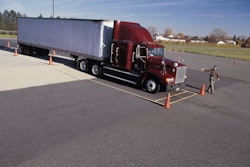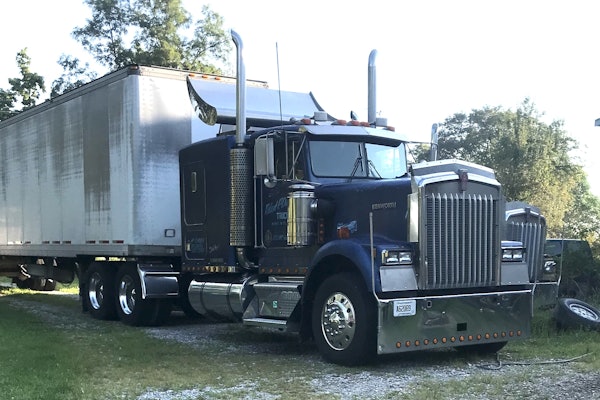Trucking news and briefs for Tuesday, June 6, 2023:
Hours regs waived in Canada for Nova Scotia wildfire relief
Wildfires in Nova Scotia, Canada, have prompted Canadian trucking regulator Transport Canada to suspend hours of service regulations for drivers transporting essential supplies and equipment in direct assistance of emergency relief efforts.
The exemption applies to extra-provincial trucks, or those domiciled outside of Nova Scotia, and their drivers providing assistance to the emergency.
Carriers intending to operate under the exemption are required to notify in writing the provincial hours of service director in their base jurisdiction of their intent to operate, and provide documentation about which trucks will be operating under the exemption, their license plate numbers, the drivers who will operate the trucks, and the drivers’ license numbers.
While operating under the exemption, drivers are required to record and maintain their records of duty status, keep a copy of the exemption in the cab, encourage shippers to indicate on the bill of lading that the supplies and equipment being transported are in direct assistance of the relief effort, and more.
The exemption is valid through June 12, unless canceled sooner.
[Related: FMCSA to Congress: Safety impacts of 2020 HOS changes inconclusive so far]

Operation Safe Driver Week a month away with focus on speeding
The Commercial Vehicle Safety Alliance’s annual initiative targeting unsafe driving behaviors of both commercial and passenger vehicle drivers will be held July 9-15.
Those exhibiting unsafe driving behaviors will be pulled over and given a warning and/or issued a ticket/citation by law enforcement, CVSA said.
The weeklong traffic enforcement and awareness campaign aims to identify unsafe drivers, deter dangerous driving behaviors and prompt positive driving habits through officer interactions with drivers.
[Related: Another reason to fight traffic tickets: Convictions can now impact your safety ratings]
Examples of unsafe driver behaviors that law enforcement will be watching for are speeding, improper lane changes, passing or turns, driving while under the influence of drugs or alcohol, using a handheld device, failure to wear a seat belt, and more.
Each year, Operation Safe Driver Week focuses on a specific unsafe driving behavior to call attention to the dangers of that behavior. This year, the focus will be on speeding. CVSA has continued to focus on speeding because it remains a persistent problem, the organization said. Speeding increases the frequency and severity of crashes, and unsafe speeds are a well-documented factor in fatalities and injuries.
[Related: Nearly 800 trucks sidelined during unannounced inspection blitz]
CDLDU joins push against mandated speed limiters
To an unseasoned trainee, the easiest pressure release is to speed. That's according to a recent release from the CDL Drivers Unlimited group weighing in with support for the DRIVE Act, introduced by Oklahoma House rep Josh Brecheen, which would prohibit the Federal Motor Carrier Safety Administration from moving forward with a mandate for speed limiter use.
Carriers who train drivers in team operations extensively use speed limiters to "control their operations," according to CDLDU, and most speed limiter use today is "centered around training and behavior changes." AI and telematics, further, are leading advancements in speed management, the group contended.
Yet another "ill-founded regulation" is unecessary, CDLDU said.
As Overdrive reported after the conclusion of last year's comment period on FMCSA's intent to pursue a mandate, most of the well more than 15,000 comments reflected the views of most Overdrive readers, too, against the notion of a speed limiter mandate. Since introduction just more than a month ago, the Brecheen-introduced bill now has 14 cosponsors, still all Republican reps.
CDLDU noted it questions the motivations of those who've lodged support of a limiter mandate, such as the American Trucking Associations and the larger businesses among its members. "Training carriers, mostly mega carriers, would like to see all carriers mandated by the FMCSA," CDLDU said, "because it eliminates a competitive advantage that small business carriers have -- which is the flexibility to adjust to the various state speed limits."
[Related: Speed limiters: How fast is too fast?]
Crash-victims/safety advocacy organizations also are quick to inveigh in support of a mandate, often citing crash statistics that paint a picture of rising fatalities over time. CDLDU called such organizations "well-intentioned," but urged them and others to look beyond the National Highway Traffic Safety Administration's broad large truck crash statistics for a better measure of trucking safety. The "Large Truck" measure there includes vehicles as small as Class 3 pickups all the way through Class 8 straight trucks and/or combination tractor-trailers.
CDLDU noted it reviewed a crash analysis for combination trucks alone, with results showing considerable safety improvement over two decades. "Big Rigs are 71% safer today than 20 years ago," CDLDU contended, not to mention the large majority of truck-involved crashes being the prinipal responsibility of the non-commercial party to the crash. The group pledged to continue to work to reverse FMCSA's intent to pursue speed limiters.
[Related: 'It's unconscionable overtime pay not required']
Arrow Truck Sales leaving Texas
Arrow Truck Sales will discontinue selling operations at its branches in Dallas, Houston and San Antonio, effective July 31.
All other Arrow branch locations in the United States and Canada will continue operations, business as usual, the company said. Arrow also will continue to support its Texas customers on after-sales situations through its corporate customer service department.
The closure of the Arrow branches in Texas comes as a significant disappointment to Arrow and its business partners and is an unfortunate loss to the overall trucking industry in the state of Texas, the company said. The closure is driven by Texas state regulations, which prohibit motor vehicle manufacturers from operating as a motor vehicle selling dealership.
Arrow, a subsidiary of the Volvo Group, is classified in the state of Texas as a manufacturer, and thus is affected by this regulation.
In 2007, the company secured a temporary exception that allowed Arrow to continue operations through Aug. 31, 2023. With the expiration of that exception approaching, the company is working to discontinue selling operations in an orderly fashion, in accordance with state regulations, while transitioning employees, business partners and customers as smoothly as possible.
Employees who are open to relocation will be eligible for transfer to other Arrow locations. Business partners have been notified and are working in parallel to modify their own operations to adjust to this impact, the company said.
Additionally, Arrow says existing customers will continue to communicate directly with Arrow’s customer service and warranty department on any after-sales-related concerns. All Arrow warranties and third-party vehicle service contracts will be honored in accordance with sales agreements. Any related repair service will continue to be conducted by affiliated repair shops in the state of Texas, as they are not affected by this legislation.
Arrow said customers with financing through its sister company, Transport Funding, will continue to be serviced without interruption. Texas customers interested in purchasing subsequent trucks from Arrow will be able to do so through other Arrow locations outside of Texas. Additional information will be shared with existing customers over the coming months to ensure a smooth transition, the company said.









